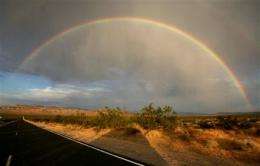Feinstein seeks block solar power from desert land

(AP) -- California's Mojave Desert may seem ideally suited for solar energy production, but concern over what several proposed projects might do to the aesthetics of the region and its tortoise population is setting up a potential clash between conservationists and companies seeking to develop renewable energy.
Nineteen companies have submitted applications to build solar or wind facilities on a parcel of 500,000 desert acres, but Sen. Dianne Feinstein said Friday such development would violate the spirit of what conservationists had intended when they donated much of the land to the public.
Feinstein said Friday she intends to push legislation that would turn the land into a national monument, which would allow for existing uses to continue while preventing future development.
The Wildlands Conservancy orchestrated the government's purchase of the land between 1999-2004. It negotiated a discount sale from the real estate arm of the former Santa Fe and Southern Pacific Railroad and then contributed $40 million to help pay for the purchase. David Myers, the conservancy's executive director, said the solar projects would do great harm to the region's desert tortoise population.
"It would destroy the entire Mojave Desert ecosystem," said David Myers, executive director of The Wildlands Conservancy.
Feinstein said the lands in question were donated or purchased with the intent that they would be protected forever. But the Bureau of Land Management considers the land now open to all types of development, except mining. That policy led the state to consider large swaths of the land for future renewable energy production.
"This is unacceptable," Feinstein said in a letter to Interior Secretary Ken Salazar. "I urge you to direct the BLM to suspend any further consideration of leases to develop former railroad lands for renewable energy or for any other purpose."
In a speech last year, Republican Gov. Arnold Schwarzenegger complained about environmental concerns slowing down the approval of solar plants in California.
"If we cannot put solar power plants in the Mojave desert, I don't know where the hell we can put it," Schwarzenegger said at Yale University.
But Karen Douglas, chairman of the California Energy Commission, said Feinstein's proposal could be a "win-win" for energy and conservation. The governor's office said Douglas was speaking on the administration's behalf.
"The opportunity we see in the Feinstein bill is to jump-start our own efforts to find the best sites for development and to come up with a broader conservation plan that mitigates the impact of the development," Douglas said.
Douglas said that if the national monument lines were drawn without consideration of renewable energy then a conflict was likely, but it's early enough in the planning process that she's confident the state will be able to get more solar and wind projects up and running without hurting the environment.
"We think we can do both," Douglas said. "We think this is an opportunity to accelerate both."
Greg Miller of the Bureau of Land Management said there are 14 solar energy and five wind energy projects that have submitted applications seeking to develop on what's referred to as the former Catellus lands. None of the projects are close to being approved, he said.
The land lies in the southeast corner of California, between the existing Mojave National Preserve on the north and Joshua Tree National Park on the south.
"They all have to go through a rigorous environmental analysis now," Miller said. "It will be at best close to two years out before we get some of these grants approved."
Feinstein's spokesman, Gil Duran, said the senator looks forward to working with the governor and the Interior Department on the issue.
"There's plenty of room in America's deserts for the bold expansion of renewable energy projects," Duran said.
---
On the Net:
The Wildlands Conservancy: http://wildlandsconservancy.org
©2009 The Associated Press. All rights reserved. This material may not be published, broadcast, rewritten or redistributed.















